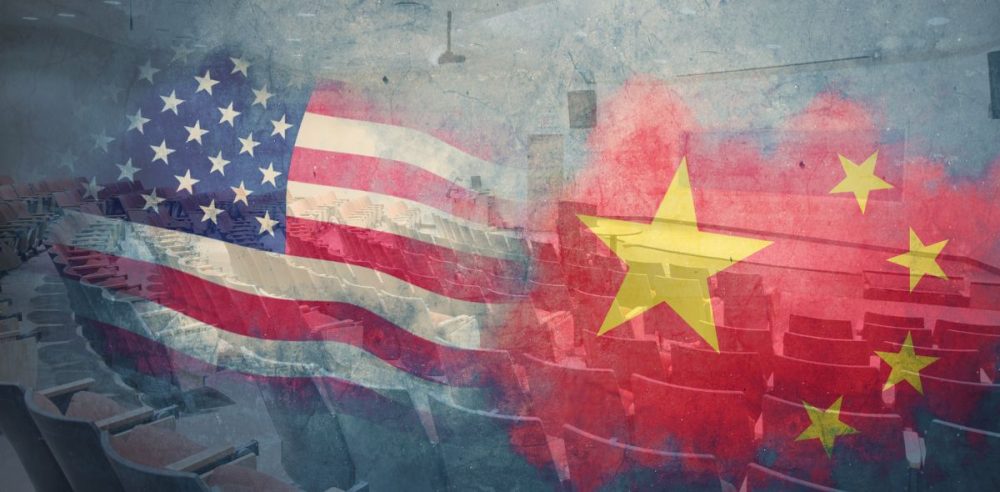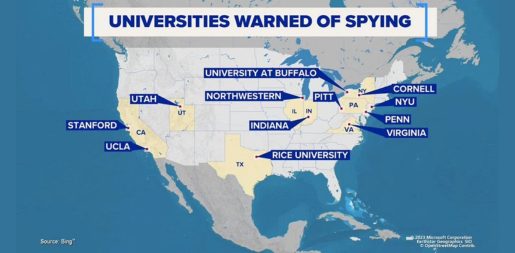The core function of any sovereign state is to protect its people. This is not merely a matter of tradition or political sentiment. It is the cornerstone of legitimacy. No policy, program, or platitude that undermines national security can long endure in a system that values its own continuity. The United States today faces a dilemma of precisely this sort in the form of student visa issuance to nationals of the People’s Republic of China. It is not a question of prejudice. It is a question of prudence.
The Chinese Communist Party (CCP) subjects its citizens, wherever they reside, to the sweeping dictates of the 2017 National Intelligence Law. Most notably, Article 7 of that law mandates that all Chinese citizens and organizations must, upon request, support and cooperate with state intelligence work. There are no geographic exceptions. There are no due process requirements. And there is no meaningful ability for a citizen, once contacted by the state, to say “no.”
Now consider the implications. A Chinese graduate student in physics at MIT is, under this law, legally obligated to assist Beijing’s Ministry of State Security should it come calling. He may be compelled to pass along blueprints, forward emails, document conversations, or surveil colleagues. Failure to comply is not a personal choice, it is a criminal offense under Chinese law. And compliance is expected regardless of whether the student resides in Shanghai or San Francisco. Thus, the presence of Chinese nationals on American campuses is not merely a matter of educational exchange. It is, by virtue of Chinese law, a latent national security vulnerability.
Some might object that such concerns are speculative, or that only a minority of students would ever be asked to spy. Perhaps. But this retort misses the structural point. The threat lies not in what Chinese students choose to do, but in what they are legally compelled to do. In constitutional democracies, we typically presume that individuals act according to conscience or law. Under the CCP’s framework, it is the Party that defines the law, conscience, and the boundary between private citizen and state operative.
This is no mere hypothetical. The U.S. Department of Justice has explicitly warned that institutions of higher learning across the country are vulnerable to infiltration by Chinese intelligence operatives. According to DOJ assessments, the motives of some international students extend beyond academic pursuit and include the transfer of sensitive knowledge and technology to the Chinese government. More than 60 universities, spanning from the Pac-12 through the Big 12 to the Ivy League, have been warned of active efforts by Chinese nationals to exploit their academic access for the benefit of a foreign superpower.
In October 2021, the DOJ concluded a decade-long investigation that culminated in charges against four Chinese nationals accused of conspiring to recruit American university professors, federal law enforcement officers, and state homeland security officials as agents of the Chinese state. Similar cases abound. A professor at the University of Texas, Bo Mao, was accused of using his university credentials to obtain proprietary technology from a Silicon Valley startup, which he then transferred to a Huawei subsidiary. The chairman of Harvard’s chemistry department was arrested for concealing his involvement in a Chinese talent recruitment program. That same day, a former Boston University student was charged with visa fraud for hiding her rank as a lieutenant in the People’s Liberation Army.
Other documented cases include a Chinese cancer researcher affiliated with Harvard caught with stolen lab materials, a UCLA scholar convicted for exporting missile technology, and a student at Illinois Institute of Technology charged with recruiting spies for Chinese intelligence. These are not isolated events, but indicators of a systemic strategy. As Bill Evanina, then the top counterintelligence official in the Office of the Director of National Intelligence, put it, “A lot of our ideas, technology, research, innovation is incubated on those university campuses. That’s where the science and technology originates — and that’s why it’s the most prime place to steal.”
The National Institutes of Health echoes these concerns, warning of systematic attempts by foreign actors to influence researchers and peer reviewers, particularly in fields like biomedical science. The pattern repeats across sectors: defense, energy, and beyond. As Boston’s top FBI agent Joseph Bonavolonta starkly concluded, “No country poses a greater, more severe or long-term threat to our national security and economic prosperity than China. China’s communist government’s goal, simply put, is to replace the U.S. as the world superpower, and they are breaking the law to get there.”
The case of Ji Chaoqun, a Chinese engineering student in Chicago convicted in 2022 of assisting Chinese intelligence, is emblematic. He was not exceptional. He was, tragically, predictable under a regime that regards every citizen as a potential intelligence asset.
To be clear, the vast majority of Chinese students are not spies. They are not villains. They are, in many cases, victims of their own government’s paranoia and coercion. The Ministry of State Security has a documented pattern of pressuring Chinese nationals abroad by threatening their family members who remain in China, effectively using loved ones as collateral to compel cooperation. This renders resistance not merely difficult but, for many, unthinkable. But victimhood does not erase vulnerability. A foreign student can be simultaneously innocent in intent and dangerous in potential. Our visa policy must account for the latter. We do not issue firearms to children on the theory that most would never misuse them. We withhold them because of the potential for harm. The same logic applies here.
President Trump, having returned to office with a mandate to restore American strength, has every constitutional and statutory authority to suspend the issuance and renewal of student visas to Chinese nationals. The Immigration and Nationality Act empowers the Executive to deny entry to classes of foreign nationals deemed detrimental to US interests. A blanket suspension of Chinese student visas, grounded in a good faith assessment of systemic espionage risk, falls well within this prerogative.
Critics will decry such a policy as discriminatory or xenophobic. But here, precision is necessary. Discrimination, in the legal and moral sense, entails unequal treatment without justification. National security, by contrast, is a categorical justification recognized in every major legal tradition. It is why we prohibit enemy combatants from enrolling in officer training. It is why we vet foreign investments for strategic risks. To pretend that a foreign student body, legally conscriptable by a hostile regime, poses no special concern is to abandon reason for sentimentality.
There is precedent. During the Cold War, the U.S. restricted visas to Soviet nationals on similar grounds. The logic was sound then and remains so now. Indeed, the contemporary challenge is arguably more acute. The Soviets lacked the technological tools and global reach the Chinese now wield. Where the KGB relied on human operatives, the MSS can now leverage encrypted apps, cloud storage, and diaspora networks. A graduate student in Boston with access to research servers is, today, a more effective intelligence asset than many Cold War spies ever were.
Nor is this concern confined to espionage in the narrow sense. As recent reports have documented, Chinese consulates often work through campus-based organizations like the Chinese Students and Scholars Association (CSSA) to monitor dissent, suppress speech, and enforce ideological conformity. These activities, while less sensational than espionage, are equally corrosive to the principles of academic freedom and individual autonomy. They are, in effect, exercises in extraterritorial authoritarianism. And they depend, crucially, on the presence of Chinese nationals within the American educational system.
None of this implies that Chinese students should be banned in perpetuity. A suspension is a stopgap, not a sentence. The appropriate course would be to impose a moratorium pending an exhaustive review of all student visa applicants from China, to be conducted by intelligence and security agencies under the direction of Secretary Rubio. This review should assess not merely individual backgrounds but systemic vulnerabilities, including institutional ties to the PLA or Chinese state agencies.
The argument, then, is not for isolationism. It is for insulation. The open society must remain open, but not to the naive assumption that all who enter come in good faith or operate on equal terms. When a foreign regime arrogates to itself the right to conscript any citizen as a spy, it renders its citizens de facto agents of the state, whether they wish to be or not. In that context, national origin is not incidental. It is dispositive.
Moreover, such a policy may ultimately benefit Chinese students themselves. A clear U.S. stance could signal to the CCP that its extraterritorial surveillance regime carries consequences. In time, this may reduce the coercive pressure on Chinese citizens abroad, restoring the space for true academic exchange. Paradoxically, the best way to safeguard future cooperation may be to halt it temporarily in the face of coercive asymmetry.
Policy is not made in a vacuum. The United States is in a period of strategic rivalry with a peer adversary whose political system is fundamentally hostile to liberal values. The CCP views education not as a neutral good but as a vector for influence. To ignore that fact is not enlightened, it is derelict.
President Trump should act. He should instruct Secretary Rubio to suspend new and renewed student visa processing for all Chinese nationals, effective immediately, pending a full interagency review. He should do so not from hostility, but from clarity. American universities are not battlegrounds for foreign intelligence. They are sanctuaries of thought. If we fail to protect them, we will soon find we have nothing left to protect at all.
A. Muse is an entrepreneur and social media influencer.



